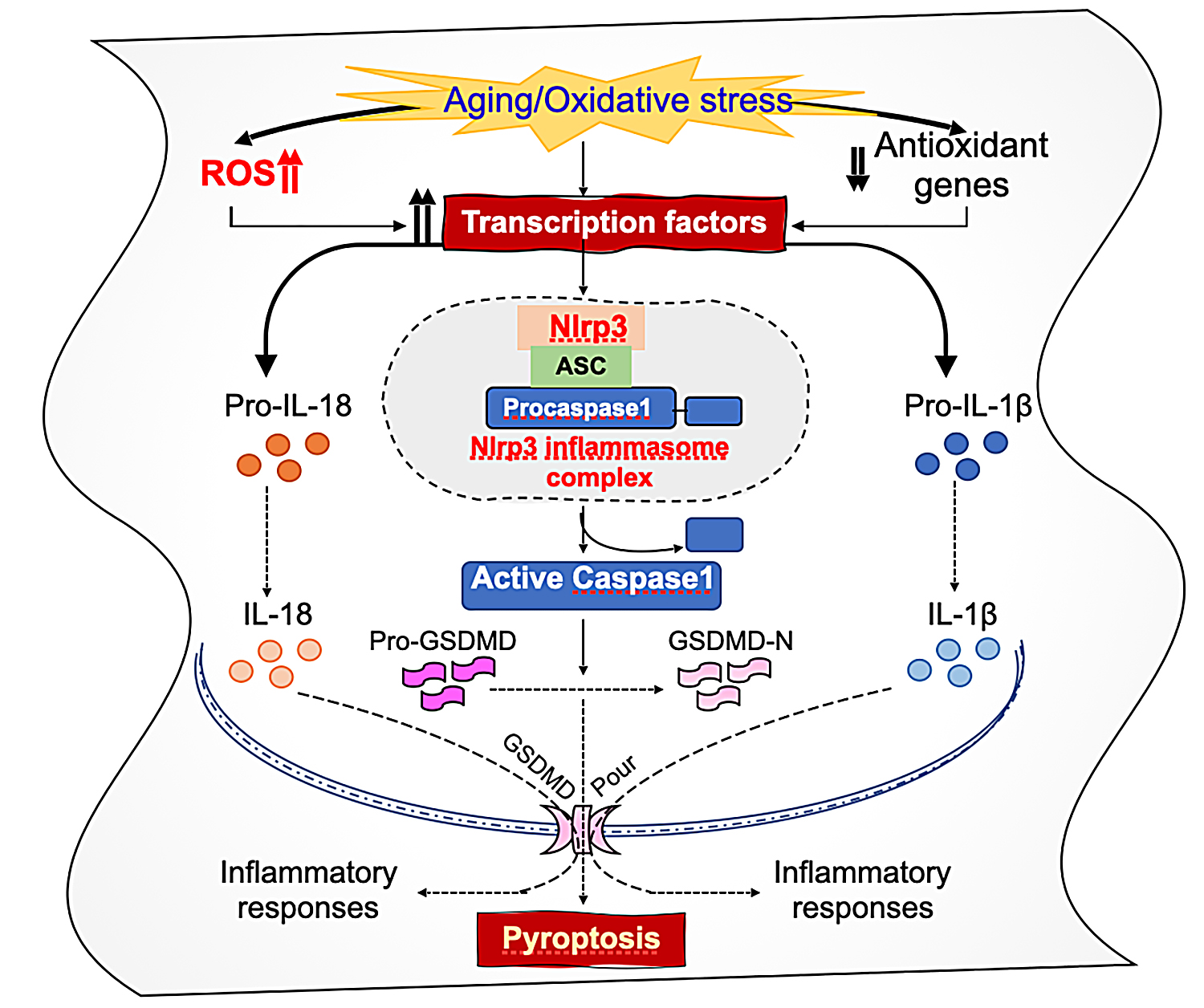Chhunchha Lab

Dr. Chhunchha investigates and studies the underlying molecular mechanism in initiation and progression of age-related pathologies. She studies oxidative stress-and aging-induced augmented Nlrp3 inflammasome activation and pathobiology in the eye lens, and to disclose the role of Nlrp3 inflammasome signaling in the onset of age-related cataract (ARC). Evaluation of progression of ARC with advancing age and its correlation with oxidative stress and Nlrp3 inflammasome activation-mediated lens pathobiology. She is interested in finding out the causes and factors responsible for activation of pathogenic signaling during aging that leads to disease-states. She also focuses different kind of cell death such as apoptosis, pyroptosis, ferroptosis etc in aging cells or cells facing oxidative stress (Figure 1).

Dr. Chhunchha’s general interests are to explore cellular antioxidant defense systems, how the antioxidant system goes awry during aging and leads to age-associated diseases, and how this defense system can be reactivated in aging lenses or lens epithelial cells (LECs), an excellent model system to study aging disorders. During the studies, her research group identified two survival molecules, Peroxiredoxin (Prdx) 6 and Lens Epithelial Derived Growth Factor (LEDGF) which are prerequisite for cell survival during aging and oxidative stress. These proteins may be a fruitful therapeutic target for treating or postponing age-associated diseases. She along with her research colleagues are trying to develop transcription-based inductive therapy by using naturally occurring compound such as Curcumin, Sulforaphane, Ginkgolic acid etc., as well as known anti-aging drugs, like Metformin and Hydralazine to enhance endogenously occurring antioxidant defense molecules, like Prdx6, catalase and GPxs through their trans-regulators, Nrf2 or Bmal1 or Sp1. This will avoid direct DNA or protein delivery, which is cumbersome and not widely acceptable. Research also focuses on the role of oxidative or aging stress-linked aberrant posttranslational modifications of Prdx6 & LEDGF that may modulate the functionality of these molecules and exploring how the aberrant modification(s) should be blocked in favor of cell survival.
Currently, Dr. Chhunchha research is dedicated to deciphering the role of inflammasome(s)-mediated-inflammatory responses and their contribution in etiopathology of age-related blinding diseases. Using Lenses/lens epithelial cells as a model system, she found that aging/oxidative stress or dysregulation of antioxidant pathway leads to induction of Nlrp3 (Nod-like receptor), pyrin domain-containing protein 3) inflammasome-mediated inflammation and cell death, like pyroptosis. Based upon this finding, she postulates that during aging or oxidative stress, positive loop of Nlrp3 and oxidative stress [induced by increased reactive oxygen species (ROS)] participate in the inflammatory processes of sustained activation (Inflammageing), which ultimately results in Aging associated diseases, like cataracts. She is looking for treatment options for Inflammageing and believe that the treatment of inflammatory responses/cell death can rely on small molecules, like anti-aging molecules, Metformin or Hydralazine that may interfere with inflammatory mediators or their biological targets, by inducting and restoring antioxidant response. Toward this, she along with her research group has found that Hydralazine or Metformin can abate the process of pathological process induced by oxidative stress generated through extrinsic/intrinsic stimulus.
Ongoing projects
- Identification of Inflammasome activation-mediated inflammatory genes responsible for inflammatory cell death during aging/oxidative stress and its prevention using small molecules, including FDA approved drugs-related to anti-aging or antioxidative.
- Understanding the mechanisms responsible for Nlrp3 inflammasome activation-mediated inflammatory pathways, and to develop target-based therapy to delay/block inflammation-dependent pathogenic signaling responsible for age related diseases, including age-related cataract.
- FDA approved anti-diabetic drug Metformin treatment in-vivo/in-vitro/ex-vivo protect the cells against oxidative stress by enhancing the Prdx6 transcription via activation of Nrf2 and by inactivation of Bach1, a Nrf2 competitor for ARE site via AMPK activation.
- Assessing the efficacy of Hydralazine, FDA approved anti-hypertensive drug, for preventing/delaying the age-related cataract by enhancing the antioxidant defense system via Nrf2 activation.
- Examining the protective efficacy of Sumoylation-deficient Prdx6-NPs in protecting and augmenting corneal wound healing process of corneal wound healing.

Bhavana Chhunchha, PhD
Assistant Professor, UNMC Department of Ophthalmology and Visual Sciences
Office: 402-559-8809
Lab: 402-559-8807